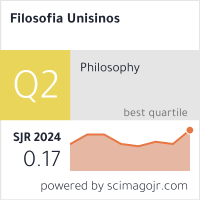The cogito of Descartes as an extreme resumption of “know thyself”
DOI:
https://doi.org/10.4013/5003Resumen
The goal of the article is to analyze the cogito (the epistemic presupposition of Descartes’ science) from a very specific point of view: as an extreme resumption of know thyself, the maxim that originated and stirred philosophizing in its beginning. The article takes as a reference La Recherche de la Verité, a dialogue Descartes wrote in 1641, right after the Meditations. The truth alluded to refers, on the one hand, to the precepts of science, that is, to what about things and phenomena we can objectively affirm as constituting knowledge; on the other hand, to the knowing subject, in relation to which the cogito, beyond overcoming doubt (pertaining to knowledge in general), has the role of rescuing the I in its own singularity: as the objective, human I, naturally given to self-knowledge as a knowing subject.
Key words: Descartes, cogito, truth, knowledge, science.Descargas
Métricas
Descargas
Publicado
Cómo citar
Número
Sección
Licencia
Concedo a revista Filosofia Unisinos – Unisinos Journal of Philosophy o direito de primeira publicação da versão revisada do meu artigo, licenciado sob a Licença Creative Commons Attribution 4.0 (que permite o compartilhamento do trabalho com reconhecimento da autoria e publicação inicial nesta revista).
Afirmo ainda que meu artigo não está sendo submetido a outra publicação e não foi publicado na íntegra em outro periódico e assumo total responsabilidade por sua originalidade, podendo incidir sobre mim eventuais encargos decorrentes de reivindicação, por parte de terceiros, em relação à autoria do mesmo.










